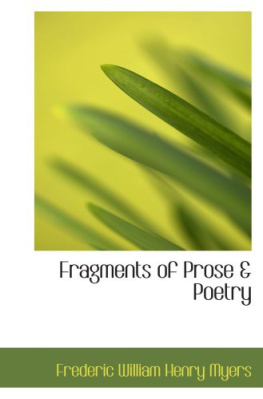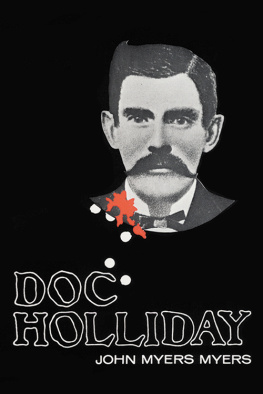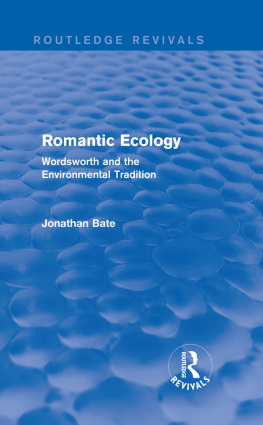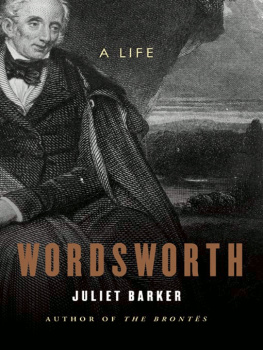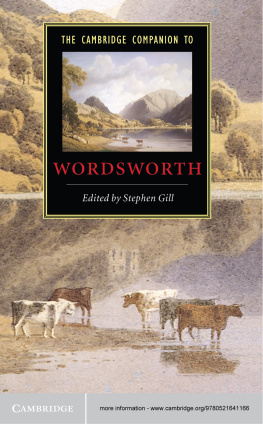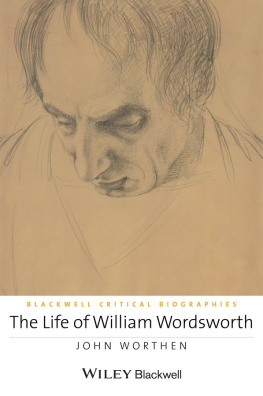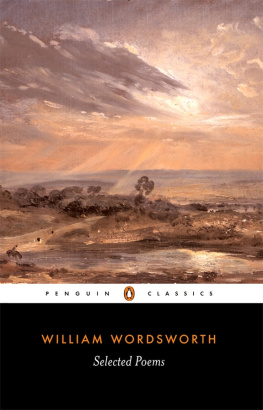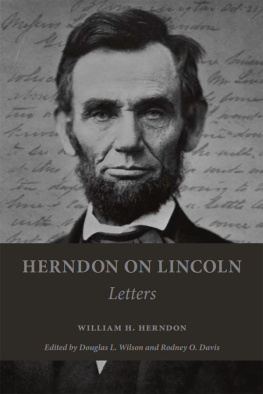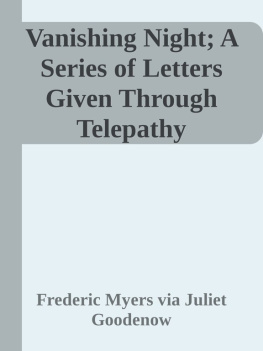
ENGLISH MEN OF LETTERS
WORDSWORTH
F. W. H. MYERS

This 2011 edition published by Barnes & Noble, Inc.
All rights reserved. No part of this publication may be reproduced, stored in a retrieval system, or transmitted, in any form or by any means, electronic, mechanical, photocopying, recording, or otherwise, without prior written permission from the publisher.
Barnes & Noble, Inc.
122 Fifth Avenue
New York, NY 10011
ISBN: 978-1-4114-3908-5
CONTENTS
CHAPTER I
BIRTH AND EDUCATION.CAMBRIDGE
I CANNOT, PERHAPS, MORE fitly begin this short biography than with some words in which its subject has expressed his own feelings as to the spirit in which such a task should be approached. Silence, says Wordsworth, is a privilege of the grave, a right of the departed: let him, therefore, who infringes that right by speaking publicly of, for, or against those who cannot speak for themselves, take heed that he opens not his mouth without a sufficient sanction. Only to philosophy enlightened by the affections does it belong justly to estimate the claims of the deceased, on the one hand, and of the present age and future generations, on the other, and to strike a balance between them. Such philosophy runs a risk of becoming extinct among us, if the coarse intrusions into the recesses, the gross breaches upon the sanctities, of domestic life, to which we have lately been more and more accustomed, are to be regarded as indications of a vigorous state of public feeling. The wise and good respect, as one of the noblest characteristics of Englishmen, that jealousy of familiar approach which, while it contributes to the maintenance of private dignity, is one of the most efficacious guardians of rational public freedom.
In accordance with these views the poet entrusted to his nephew, the present Bishop of Lincoln, the task of composing memoirs of his life, in the just confidence that nothing would by such hands be given to the world which was inconsistent with the dignity either of the living or of the dead. From those memoirs the facts contained in the present work have been for the most part drawn. It has, however, been my fortune, through hereditary friendships, to have access to many manuscript letters and much oral tradition bearing upon the poets private life; and some details and some passages of letters hitherto unpublished will appear in these pages. It would seem, however, that there is but little of public interest in Wordsworths life which has not already been given to the world, and I have shrunk from narrating such minor personal incidents as he would himself have thought it needless to dwell upon. I have endeavoured, in short, to write as though the Subject of this biography were himself its Auditor, listening, indeed, from some region where all of truth is discerned and nothing but truth desired, but checking by his venerable presence any such revelation as public advantage does not call for, and private delicacy would condemn.
As regards the critical remarks which these pages contain, I have only to say that I have carefully consulted such notices of the poet as his personal friends have left as, and also, I believe, nearly every criticism of importance which has appeared on his works. I find with pleasure that a considerable agreement of opinion existsthough less among professed poets or critics than among men of eminence in other departments of thought or action whose attention has been directed to Wordsworths poems. And although I have felt it right to express in each case my own views with exactness, I have been able to feel that I am not obtruding on the reader any merely fanciful estimate in which better accredited judges would refuse to concur.
Without further preface I now begin my story of Wordsworths life, in words which he himself dictated to his intended biographer. I was born, he said, at Cockermouth, in Cumberland, on April 7th, 1770, the second son of John Wordsworth, attorney-at-lawas lawyers of this class were then calledand law-agent to Sir James Lowther, afterwards Earl of Lonsdale. My mother was Anne, only daughter of William Cookson, mercer, of Penrith, and of Dorothy, born Crackanthorp, of the ancient family of that name, who from the times of Edward the Third had lived in Newbiggen Hall, Westmoreland. My grandfather was the first of the name of Wordsworth who came into Westmoreland, where he purchased the small estate of Sockbridge. He was descended from a family who had been settled at Peniston, in Yorkshire, near the sources of the Don, probably before the Norman Conquest. Their names appear on different occasions in all the transactions, personal and public, connected with that parish; and I possess, through the kindness of Colonel Beaumont, an almery, made in 1525, at the expense of a William Wordsworth, as is expressed in a Latin inscription carved upon it, which carries the pedigree of the family back four generations from himself. The time of my infancy and early boyhood was passed partly at Cockermouth, and partly with my mothers parents at Penrith, where my mother, in the year 1778, died of a decline, brought on by a cold, in consequence of being put, at a friends house in London, in what used to be called a best bedroom. My father never recovered his usual cheerfulness of mind after this loss, and died when I was in my fourteenth year, a school-boy, just returned from Hawkshead, whither I had been sent with my elder brother Richard, in my ninth year.
I remember my mother only in some few situations, one of which was her pinning a nosegay to my breast, when I was going to say the catechism in the church, as was customary before Easter. An intimate friend of hers told me that she once said to her that the only one of her five children about whose future life she was anxious was William; and he, she said, would be remarkable, either for good or for evil. The cause of this was that I was of a stiff, moody, and violent temper; so much so that I remember going once into the attics of my grandfathers house at Penrith, upon some indignity having been put upon me, with an intention of destroying myself with one of the foils which I knew was kept there. I took the foil in hand, but my heart failed. Upon another occasion, while I was at my grandfathers house at Penrith, along with my eldest brother, Richard, we were whipping tops together in the large drawing-room, on which the carpet was only laid down upon particular occasions. The walls were hung round with family pictures, and I said to my brother, Dare you strike your whip through that old ladys petticoat? He replied, No, I wont. Then, said I, here goes! and I struck my lash through her hooped petticoat; for which, no doubt, though I have forgotten it, I was properly punished. But, possibly from some want of judgment in punishments inflicted, I had become perverse and obstinate in defying chastisement, and rather proud of it than otherwise.
Of my earliest days at school I have little to say, but that they were very happy ones, chiefly because I was left at liberty then, and in the vacations, to read whatever books I liked. For example, I read all Fieldings works, Don Quixote, Gil Bias, and any part of Swift that I likedGullivers Travels, and the Tale of a Tub, being both much to my taste. It may be, perhaps, as well to mention that the first verses which I wrote were a task imposed by my masterthe subject, The Summer Vacation; and of my own accord I added others upon Return to School. There was nothing remarkable in either poem; but I was called upon, among other scholars, to write verses upon the completion of the second centenary from the foundation of the school in 1685 by Archbishop Sandys. These verses were much admiredfar more than they deserved, for they were but a tame imitation of Popes versification, and a little in his style.
Next page

